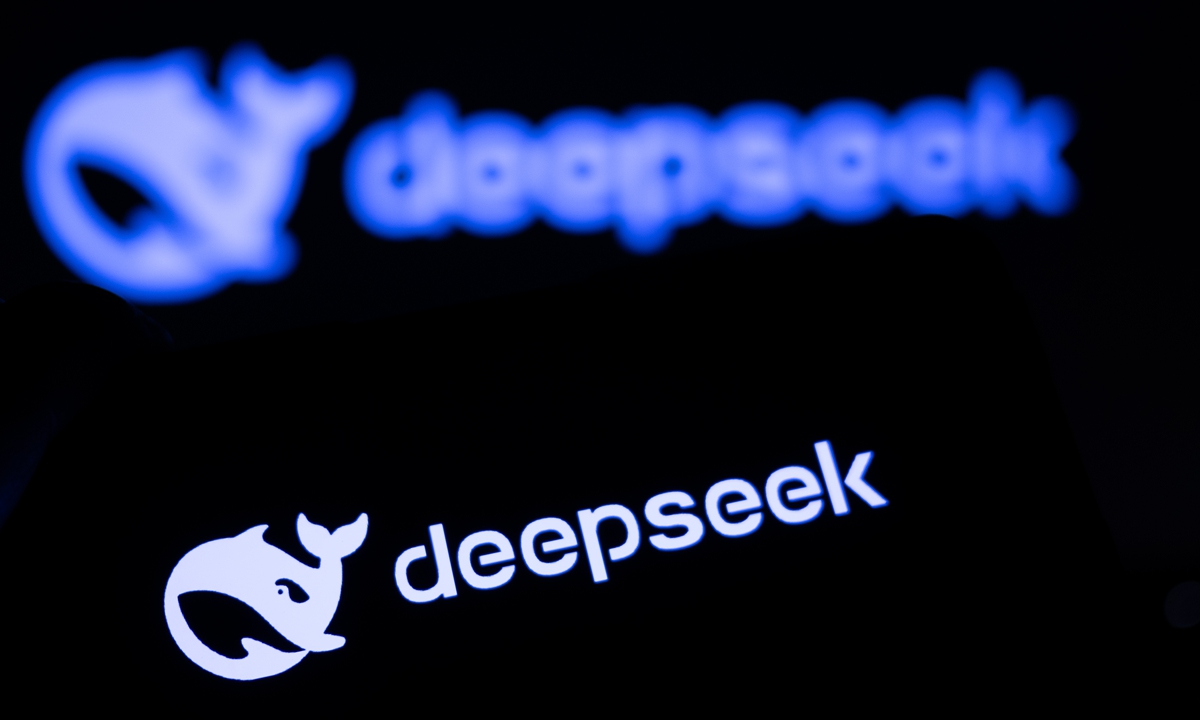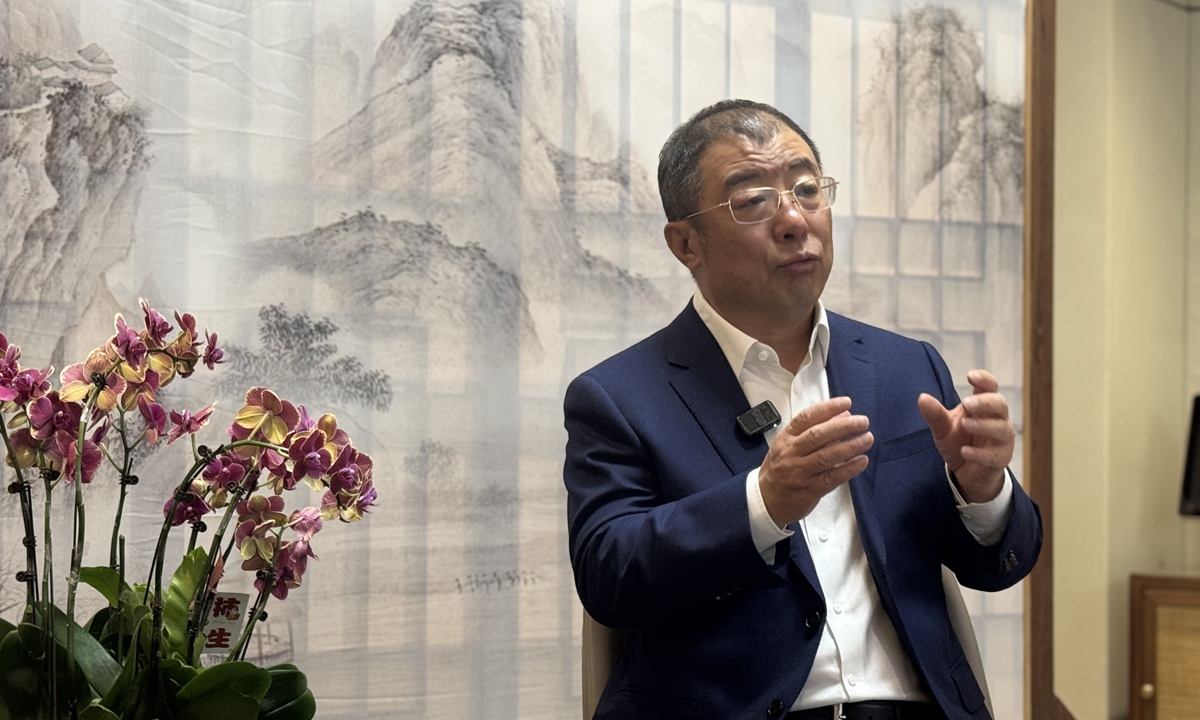
deepseek
DeepSeek has shaken the unilateral dominance of the US and Western countries over the development of AI and helps promote a huge explosion of large - model applications at a relatively low cost, Qi Xiangdong, chairman of Qi An Xin Technology Group, a Chinese cybersecurity firm, told the Global Times.
Qi noted that as soon as DeepSeek came out, targeted and high-intensity cyberattacks broke out, sounding the alarm for the AI industry to hold fast to the bottom line of security.
Qi, who is also a member of the National Committee of the Chinese People's Political Consultative Conference (CPPCC), said that in the past, when it came to large-scale AI models, people would instinctively think of OpenAI's GPT series, Google's BERT, Meta's large-scale models.

Qi Xiangdong, chairman of Qi An Xin Technology Group, a Chinese cybersecurity firm. Photo: Zhao Yusha/GT
However, DeepSeek has subverted the mainstream innovation path of "big data, large parameters, and high computing power." Compared with ChatGPT, both its training cost and its inference cost have been significantly reduced. This is a huge boon for application developers using AI models and the vast number of end-users in the consumer-facing sector, and has shaken the unilateral dominance of the US and Western countries over the development of AI, said the CPPCC member.
Qi praised DeepSeek for propelling the AI industry into a new era of greater openness and cooperation with announcement of its open-source strategy.
He said in the past, due to the dual constraints of technological blockades and commercial barriers, it was difficult to achieve efficient resource sharing and all-round collaborative development in the field of AI.
DeepSeek has, with lightning speed, opened up a large number of core assets and provided authorizations. Compared with Meta's open-source models, DeepSeek's open-source approach is more thorough, more transparent, and comes with more technical details, invigorating the open-source ecosystem. In just a few short weeks, significant progress has been made in the reproduction projects of Open R1, said Qi.
He noted after that, AI giants have also successively accelerated the opening-up and updating of their technologies. OpenAI has made its inference function publicly available for free, and Baidu has opened its Wenxin Yiyan to the public free of charge. At the same time, technology-innovation enterprises around the world have been scrambling to get connected.
DeepSeek's open-source strategy is like a "starting pistol," enabling the AI industry to start breaking free from its closed-off and isolated state, Qi said.
Qi noted that as soon as DeepSeek emerged, targeted and high-intensity cyberattacks broke out, sounding the alarm for the AI industry to firmly hold the bottom line of security.
He said the attacks evolved from initial proxy attacks, SSDP and NTP reflection amplification attacks to application-layer DDoS attacks, becoming increasingly destructive. Subsequently, more than 2,000 counterfeit and phishing websites targeting DeepSeek were detected.
In the future, as the infrastructure status of large-scale AI models becomes more prominent, targeted malicious means and risky scenarios will surge, and the accompanying security risks such as data privacy, cognitive security, and infrastructure are beyond imagination, Qi warned.
On January 29,
XLab, which belongs to Qi An Xin, reported that DeepSeek has been subjected to a series of sophisticated and large-scale cyberattacks over the past month. The attacks, which began in early January, had escalated significantly in both scale and complexity, posing unprecedented challenges to DeepSeek's operations and data security.
Qi said recently, the intensity of cyberattacks against DeepSeek has decreased, but the attacking behaviors have not completely ceased.
Qi said that currently, most government and enterprise institutions are rather casual in their deployment of large-scale AI models, and the associated network and data security risks are beyond imagination.
He said that the security issues faced by the development of AI can be the security issues of large-scale AI models, including risks in development, data collection, application and basic environment. For example, in terms of development, open-source, large-scale models may have problems such as code defects and backdoors left behind.
The other issue is the problem of cyberattacks using AI. AI has promoted the update and iteration of cyberattacks methods, making "saturation" attacks possible, said Qi, giving examples as outlaws to output false information through "face- swapping and voice-changing" for cyber fraud.
Then there are also risks of "cyberattack explosion" triggered by attacking AI. Qi explained that once large-scale AI models are embedded in key areas such as smart cities and smart government affairs, traditional security threats such as vulnerabilities will be magnified. Once a large-scale AI model is attacked, it may trigger security incidents such as interruptions in social services, production stagnation, and leakage of private data.
To cope with those threats, he suggested to establish a deep-defense system adapted to large-scale models to build a solid security foundation for AI. Then there's need to accelerate the follow-up of mandatory security compliance requirements for large-scale AI models to ensure the effectiveness and adaptability of supervision. It is also necessary to promote the implementation of the innovative achievements of "AI + security," Qi suggested.
The CPPCC member said that currently, the "grassroots-oriented" trend of AI innovation in China is quite evident, and such trend is closely related to the country's forward-looking layout, policy support and comprehensive resource investment. What makes AI unique is that it is not dominated by authorities but by numerous entrepreneurs. The sudden popularity of DeepSeek and the success of science and technology innovation enterprises well illustrate this point, Qi said.
However, it is clear that without the country as a solid backing, these "grassroots" forces would find it difficult to thrive. At the beginning of this year, a new national AI investment fund was established, unleashing more room for growth in technological innovation and application expansion, said Qi.
Qi, the CPPCC member, also suggested that the country should strengthen policy guidance, enhance the business environment and promote ecological collaboration to further boost private sector innovation and entrepreneurship.
For example, implement targeted innovation policies for tech-driven private enterprises, and offer innovation protection periods, tax incentives, and financial subsidies, leverage financial tools, establish risk compensation funds, and enhance innovation through financial backing, said Qi. At the same time, optimize computing power scheduling and take the lead in building a public technology service platform, and so forth.





